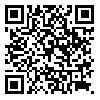Volume 23, Issue 4 (winter 2018)
Back to this Issue |
Back to browse issues page
Download citation:
BibTeX | RIS | EndNote | Medlars | ProCite | Reference Manager | RefWorks
Send citation to:



BibTeX | RIS | EndNote | Medlars | ProCite | Reference Manager | RefWorks
Send citation to:
Amiri E, Ebrahimi H, Vahidi M, Asghari Jafarabadi M, Namdar Areshtanab H. Moral sensitivity and its relationship with demographic and professional characteristics of nurses working in medical wards of hospitals affiliated to Tabriz University of Medical Sciences
. Journal of Hayat 2018; 23 (4) :295-306
URL: http://hayat.tums.ac.ir/article-1-2029-en.html
URL: http://hayat.tums.ac.ir/article-1-2029-en.html
Elham Amiri1 

 , Hossein Ebrahimi *
, Hossein Ebrahimi * 

 2, Maryam Vahidi1
2, Maryam Vahidi1 

 , Mohamad Asghari Jafarabadi3
, Mohamad Asghari Jafarabadi3 

 , Hossein Namdar Areshtanab1
, Hossein Namdar Areshtanab1 




 , Hossein Ebrahimi *
, Hossein Ebrahimi * 

 2, Maryam Vahidi1
2, Maryam Vahidi1 

 , Mohamad Asghari Jafarabadi3
, Mohamad Asghari Jafarabadi3 

 , Hossein Namdar Areshtanab1
, Hossein Namdar Areshtanab1 


1- Dept. of Psychiatric Nursing, School of Nursing and Midwifery, Tabriz University of Medical Sciences, Tabriz, Iran
2- Dept. of Psychiatric Nursing, School of Nursing and Midwifery, Tabriz University of Medical Sciences, Tabriz, Iran , Ebrahimih@tbzmed.ac.ir
3- Dept. of Statistics and Epidemiology, School of Health, Tabriz University of Medical Sciences, Tabriz, Iran; Road Traffic Injury Research Center, Tabriz University of Medical Sciences, Tabriz, Iran
2- Dept. of Psychiatric Nursing, School of Nursing and Midwifery, Tabriz University of Medical Sciences, Tabriz, Iran , Ebrahimih@tbzmed.ac.ir
3- Dept. of Statistics and Epidemiology, School of Health, Tabriz University of Medical Sciences, Tabriz, Iran; Road Traffic Injury Research Center, Tabriz University of Medical Sciences, Tabriz, Iran
Abstract: (8164 Views)
Background & Aim: Moral sensitivity has various dimensions including personal sentiments, scientific competency, and reasoning and decision making capabilities. To achieve this, some personal traits and educational preparedness are needed. The aim of this study was to determine nurses’ moral sensitivity and its relationship with demographic and professional characteristics in hospitals affiliated to Tabriz University of Medical Sciences.
Methods & Materials: This descriptive, correlational study was conducted on 198 nurses working in the medical wards of hospitals affiliated to Tabriz University of Medical Sciences in 2016. Census sampling method was implemented. Data were collected through a demographic and professional characteristics form and the Moral Sensitivity Questionnaire (MSQ). The data were analyzed by the SPSS software version 13 using descriptive statistics, T test, Pearson correlation coefficient and ANOVA.
Results: The mean score for nurses’ moral sensitivity was 4.84±0.48 (out of 7). The highest scores were related to the domains of “Interpersonal orientation” and “following the rules”. The lowest scores were related to the domains of “experiencing moral conflict” and “modifying autonomy”. There was a significant and inverse correlation between age and “modifying autonomy” (P=0.008, r=-0.193) and also between age and “following the rules” (P=0.034, r=-0.156). Moreover, there was a significant and inverse correlation between work experience and “following the rules” (P=0.009, r=-0.187).
Conclusion: Given that the nurses gained a low score in the domain of “modifying autonomy”, it is suggested that client centered care and patient’s autonomy be emphasized in developing nursing curriculum and in service training programs.
Methods & Materials: This descriptive, correlational study was conducted on 198 nurses working in the medical wards of hospitals affiliated to Tabriz University of Medical Sciences in 2016. Census sampling method was implemented. Data were collected through a demographic and professional characteristics form and the Moral Sensitivity Questionnaire (MSQ). The data were analyzed by the SPSS software version 13 using descriptive statistics, T test, Pearson correlation coefficient and ANOVA.
Results: The mean score for nurses’ moral sensitivity was 4.84±0.48 (out of 7). The highest scores were related to the domains of “Interpersonal orientation” and “following the rules”. The lowest scores were related to the domains of “experiencing moral conflict” and “modifying autonomy”. There was a significant and inverse correlation between age and “modifying autonomy” (P=0.008, r=-0.193) and also between age and “following the rules” (P=0.034, r=-0.156). Moreover, there was a significant and inverse correlation between work experience and “following the rules” (P=0.009, r=-0.187).
Conclusion: Given that the nurses gained a low score in the domain of “modifying autonomy”, it is suggested that client centered care and patient’s autonomy be emphasized in developing nursing curriculum and in service training programs.
Send email to the article author
| Rights and permissions | |
 |
This work is licensed under a Creative Commons Attribution-NonCommercial 4.0 International License. |



